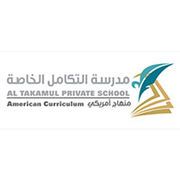

Al Takamul Private School
 Al Ain
Al Ain
 Al Ain
Al Ain

Welcome to Al Takamul Private School
Al Takamul Private School
Al Takamul Private School embodies the values of respecting individuality, striving for excellence, learning through experience, and partnering with the community whilst embedding the heritage and culture of the UAE across the school. All of the learners from Al Ain who attend Al Takamul Private School will develop a range of skills and experiences to prepare them for their life in their professional and social world. Our school will promote a love of learning through real-life problem solving and respect for the local culture within a climate that fosters the aspirations of all.
Al Takamul Private School is a place where all our learners can feel safe, both physically and emotionally and where they will feel happy and loved in a warm, welcoming, vibrant environment.
The school promotes creative ways of thinking and learning and provide opportunities for our learners to enjoy music and art in all their combinations as well as using technology to develop skills in activities such as movie production, website design, animation.
Contact Info
Al Takamul Private School
Address: Shabiat Al Khubaisi, Al Ain
Tel: +971 3 761 8987
Email: info@takamulshool.com
Website: http://takamulschool.com
